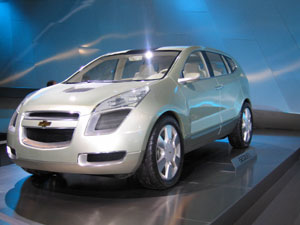 |
| Cars purported to "run on water" actually run on the hydrogen extracted from water. But hydrogen used in internal combustion engines squanders its best potential, which is to power a fuel cell. Pictured: Chevrolet's hydrogen fuel cell prototype, the Sequel. Many challenges must be overcome before fuel cell systems will be a competitive alternative for consumers, but progress is being made.
Photo: By Alan Bedenko, courtesy Flickr. |
Moreover, Chiara says, the amount of greenhouse gases produced by the vehicle “would be much larger, because two combustion processes [gasoline and hydrogen] are involved.” Finally, there is a safety consideration for consumers who add these devices to their cars. “H2 is a highly flammable and explosive gas,” he says, and would require special care in installation and use.
The electrolysis process could be viable in saving energy if a renewable, non-polluting energy source such as solar or wind could be harnessed to power it, although capturing enough of that energy source on board the car would be another hurdle.
Researchers today put more focus on using hydrogen to power fuel cells, which can replace internal combustion engines to power cars and emit only water from the tailpipe. And though hydrogen is combustible and can power an internal combustion engine, to use hydrogen in that way would squander its best potential: to power a fuel cell.
Hydrogen fuel cell cars are gaining traction, but commercialization of hydrogen fuel has not yet been accomplished. “The potential benefits of fuel cells are significant,” say researchers at the U.S. Department of Energy’s National Renewable Energy Laboratory (NREL). “[H]owever, many challenges must be overcome before fuel cell systems will be a competitive alternative for consumers.”
The state of California operates a “Hydrogen Highway” program that supports development of hydrogen fuel cell technology and infrastructure. And many companies are working on ways to produce, store and dispense hydrogen. Cars powered by fuel cells are in prototype stages now, nearing production.
While we all wait to see how that shakes out, the best choice today for high mileage and low emissions is still the gasoline/electric hybrid car.
CONTACTS:
Center for Automotive Research
NREL
California Hydrogen Highway
SEND YOUR ENVIRONMENTAL QUESTIONS TO: EarthTalk, P.O. Box 5098, Westport, CT 06881;
earthtalk@emagazine.com.
Read past columns at:
www.emagazine.com/earthtalk/archives.php